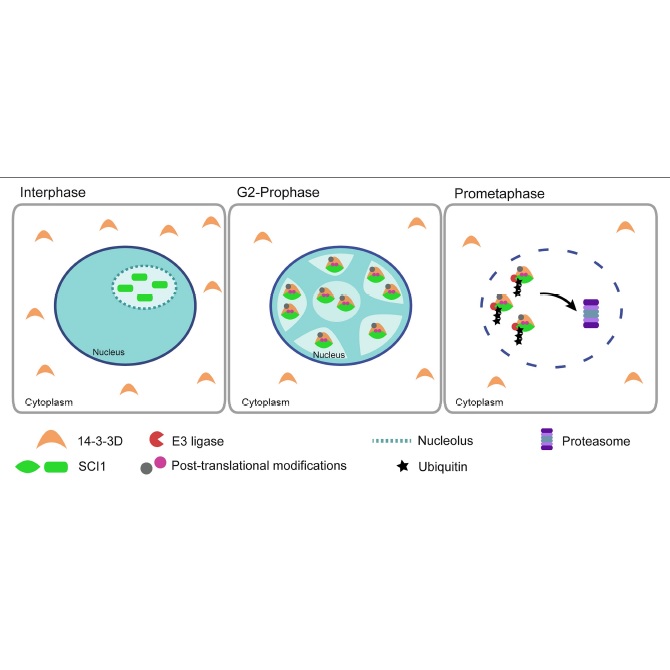Stigma/style cell-cycle inhibitor 1, a regulator of cell proliferation, interacts with a specific 14-3-3 protein and is degraded during cell division.
STRINI, Edward José; BERTOLINO, Lígia Tereza; SAN MARTIN, Juca Abramo Barrera; SOUZA, Hebréia Oliveira Almeida; PESSOTTI, Francine; PINOTI, Vitor Favaretto; FERREIRA, Pedro Boscariol; DE PAOLI, Henrique Cestari; LUBINI, Greice; DEL-BEM, Luiz-Eduardo; QUIAPIM, Andréa Carla; MONDIN, Mateus; ARAÚJO, Ana Paula Ulian de; ELOY, Nubia Barbosa; BARBERIS, Matteo; GOLDMAN, Maria Helena de Souza.
STRINI, Edward José; BERTOLINO, Lígia Tereza; SAN MARTIN, Juca Abramo Barrera; SOUZA, Hebréia Oliveira Almeida; PESSOTTI, Francine; PINOTI, Vitor Favaretto; FERREIRA, Pedro Boscariol; DE PAOLI, Henrique Cestari; LUBINI, Greice; DEL-BEM, Luiz-Eduardo; QUIAPIM, Andréa Carla; MONDIN, Mateus; ARAÚJO, Ana Paula Ulian de; ELOY, Nubia Barbosa; BARBERIS, Matteo; GOLDMAN, Maria Helena de Souza.





 Abstract: The final shape and size of plant organs are determined by a network of genes that modulate cell proliferation and expansion. Among those, SCI1 (Stigma/style Cell-cycle Inhibitor 1) functions by inhibiting cell proliferation during pistil development. Alterations in SCI1 expression levels can lead to remarkable stigma/style size changes. Recently, we demonstrated that SCI1 starts to be expressed at the specification of the Nicotiana tabacum floral meristem and is expressed at all floral meristematic cells. To elucidate how SCI1 regulates cell proliferation, we screened a stigma/style cDNA library through the yeast two-hybrid (Y2H) system, using SCI1 as bait. Among the interaction partners, we identified the 14-3-3D protein of the Non-Epsilon group. The interaction between SCI1 and 14-3-3D was confirmed by pulldown and co-immunoprecipitation experiments. 14-3-3D forms homo- and heterodimers in the cytoplasm of plant cells and interacts with SCI1 in the nucleus, as demonstrated by Bimolecular Fluorescence Complementation (BiFC). Analyses of SCI1-GFP fluorescence through the cell-cycle progression revealed its presence in the nucleoli during interphase and prophase. At metaphase, SCI1-GFP fluorescence faded and was no longer detected at anaphase, reappearing at telophase. Upon treatment with the 26S proteasome inhibitor MG132, SCI1-GFP was stabilized during cell division. Site-directed mutagenesis of seven serines into alanines in the predicted 14-3-3 binding sites on the SCI1 sequence prevented its degradation during mitosis. Our results demonstrate that SCI1 degradation at the beginning of metaphase is dependent on the phosphorylation of serine residues and on the action of the 26S proteasome. We concluded that SCI1 stability/degradation is cell-cycle regulated, consistent with its role in fine-tuning cell proliferation
Abstract: The final shape and size of plant organs are determined by a network of genes that modulate cell proliferation and expansion. Among those, SCI1 (Stigma/style Cell-cycle Inhibitor 1) functions by inhibiting cell proliferation during pistil development. Alterations in SCI1 expression levels can lead to remarkable stigma/style size changes. Recently, we demonstrated that SCI1 starts to be expressed at the specification of the Nicotiana tabacum floral meristem and is expressed at all floral meristematic cells. To elucidate how SCI1 regulates cell proliferation, we screened a stigma/style cDNA library through the yeast two-hybrid (Y2H) system, using SCI1 as bait. Among the interaction partners, we identified the 14-3-3D protein of the Non-Epsilon group. The interaction between SCI1 and 14-3-3D was confirmed by pulldown and co-immunoprecipitation experiments. 14-3-3D forms homo- and heterodimers in the cytoplasm of plant cells and interacts with SCI1 in the nucleus, as demonstrated by Bimolecular Fluorescence Complementation (BiFC). Analyses of SCI1-GFP fluorescence through the cell-cycle progression revealed its presence in the nucleoli during interphase and prophase. At metaphase, SCI1-GFP fluorescence faded and was no longer detected at anaphase, reappearing at telophase. Upon treatment with the 26S proteasome inhibitor MG132, SCI1-GFP was stabilized during cell division. Site-directed mutagenesis of seven serines into alanines in the predicted 14-3-3 binding sites on the SCI1 sequence prevented its degradation during mitosis. Our results demonstrate that SCI1 degradation at the beginning of metaphase is dependent on the phosphorylation of serine residues and on the action of the 26S proteasome. We concluded that SCI1 stability/degradation is cell-cycle regulated, consistent with its role in fine-tuning cell proliferation @article={003072399,author = {STRINI, Edward José; BERTOLINO, Lígia Tereza; SAN MARTIN, Juca Abramo Barrera; SOUZA, Hebréia Oliveira Almeida; PESSOTTI, Francine; PINOTI, Vitor Favaretto; FERREIRA, Pedro Boscariol; DE PAOLI, Henrique Cestari; LUBINI, Greice; DEL-BEM, Luiz-Eduardo; QUIAPIM, Andréa Carla; MONDIN, Mateus; ARAÚJO, Ana Paula Ulian de; ELOY, Nubia Barbosa; BARBERIS, Matteo; GOLDMAN, Maria Helena de Souza.},title={Stigma/style cell-cycle inhibitor 1, a regulator of cell proliferation, interacts with a specific 14-3-3 protein and is degraded during cell division},journal={Frontiers in Plant Science},note={v. 13, art. 857745, p. 1-14},year={2022}}
@article={003072399,author = {STRINI, Edward José; BERTOLINO, Lígia Tereza; SAN MARTIN, Juca Abramo Barrera; SOUZA, Hebréia Oliveira Almeida; PESSOTTI, Francine; PINOTI, Vitor Favaretto; FERREIRA, Pedro Boscariol; DE PAOLI, Henrique Cestari; LUBINI, Greice; DEL-BEM, Luiz-Eduardo; QUIAPIM, Andréa Carla; MONDIN, Mateus; ARAÚJO, Ana Paula Ulian de; ELOY, Nubia Barbosa; BARBERIS, Matteo; GOLDMAN, Maria Helena de Souza.},title={Stigma/style cell-cycle inhibitor 1, a regulator of cell proliferation, interacts with a specific 14-3-3 protein and is degraded during cell division},journal={Frontiers in Plant Science},note={v. 13, art. 857745, p. 1-14},year={2022}}